Iran hardliners crack down on freedom of speech
- Published
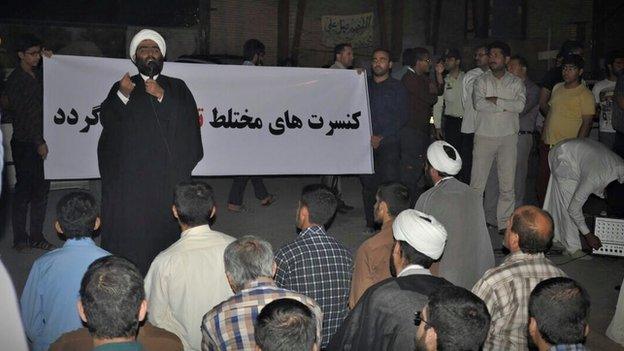
Local imam protests about the planned pop concert
When Iranian pop star Mehdi Ahmadvand announced he would be playing two nights in the small south-western town of Mahshahr in May there was palpable excitement.
Tickets for the 1,000-seat concert venue were snapped up fast.
Happy fans posted messages on Mr Ahmadvand's Facebook page saying how much they were looking forward to him coming.
But then a local imam got wind of the plans and issued a blistering condemnation in his Friday prayer sermon.
It was not Mr Ahmadvand's brand of kitschy Persian pop that the imam was objecting to.
It was the fact that the event was open to men and women, and that female musicians would be performing in his backing band.
Although both of these things are allowed in Iran, and the concert organisers had the necessary official permission, the imam said the event would undermine Islamic values.
"First they bring female musicians, then there will be female dancers," he thundered. "Soon women will want to sing."
Within days dozens of young men from a local ultra-conservative religious group descended on the concert hall holding protests and prayers.
The event was cancelled.
New trend
Iranian musicians have always had to negotiate a path through strict rules on public performance in the Islamic Republic, but observers say the Mahshahr incident is part of a new trend.
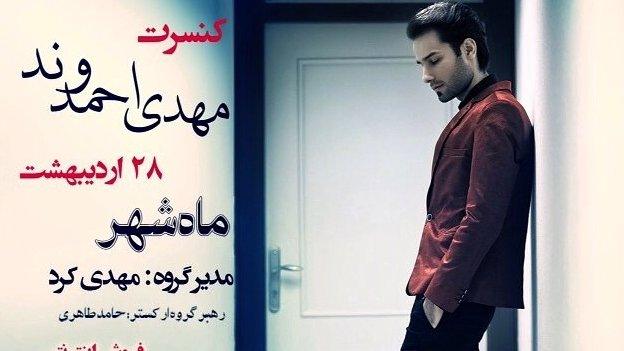
Mehdi Ahmadvand is a big star in Iran
This year more than a dozen concerts, lectures and other cultural events have been called off after pressure from hardliners - despite being officially sanctioned by the authorities.
It's been happening across the country, at concert halls and on university campuses.
In early May a group of more than 700 university professors were so concerned at the effect this was having on academic freedom they wrote an open letter to the president, the head of the Judiciary and the speaker of Parliament.
"Universities have a crucial role in forwarding knowledge," the statement said.
"In order to do that they must have sufficient independence to make decisions and sufficient security to think freely."
The statement, which was published by the student news agency ISNA, said academics had been "deeply offended" by the recent disruption of a concert at a university in Mashhad.
University attack
They also highlighted another notorious incident at the University of Shiraz, in March, when violent protesters prevented a member of parliament from addressing students.
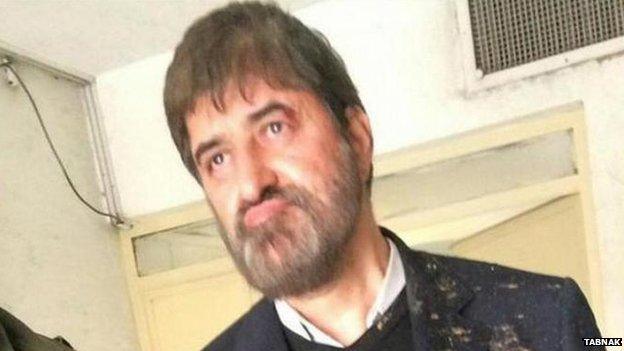
Ali Motahari was attacked for speaking out

Mr Motahari's car was pelted with stones
Ali Motahari, who has spoken out against the detention of opposition leaders in Iran, was attacked, external by ultra-conservatives on his way to the university campus.
Armed with stones, batons and pepper sprays, they smashed the windows of his taxi.
The incident, which was lauded by the Imam of Shiraz, made national headlines and pictures of a bleeding Mr Motahari were widely circulated on social media sites.
"Illegal systematic pressure has created obstacles for universities," the letter by the professors continued. "[It has] caused disappointment and a sense of insecurity."
Observers say what's happening is another symptom of the growing tension in Iranian society, between those who support the moderate President, Hassan Rouhani, and others who back religious hard-liners.
"Under [former President] Ahmadinejad there weren't nearly as many concerts and cultural events as there are now," says Paris-based political commentator and former Iranian MP Ahmad Salamatian.
"So it's inevitable there are more confrontations now between the middle classes and the radicals."
Liberal president
Mr Rouhani has made it clear he supports more personal freedom.
"The police should focus on enforcing the law rather than Islam," he said in a speech to law enforcement chiefs at the beginning of May.
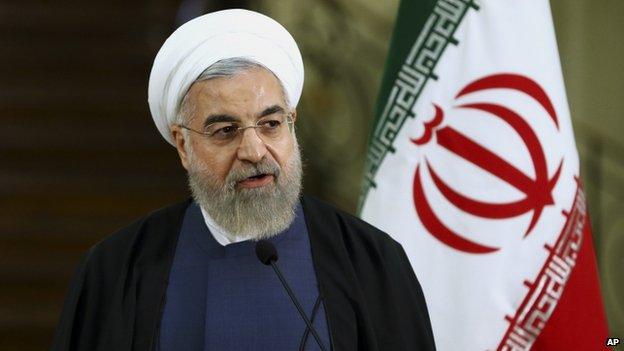
Hassan Rouhani is seen as a moderate president
It's the kind of message that infuriates hard-line clerics, who in turn can mobilise their supporters to take to the streets to defend the Islamic revolution.
These young men are mostly from poor, religious families.
They are intensely loyal to the religious establishment and to the country's Supreme Leader, Ayatollah Ali Khamenei.
They're a force the government seems unable to reckon with.
At Iran's international book fair, external, which ended on 16 May, 29 publishers were forced to leave the event after hard-line protests, despite having stalls at the event and official permission from the organisers - the Ministry of Islamic Culture and Guidance.
Withdrawn books
Ministry spokesman Hussein Noushabadi said this had happened despite "repeated requests" to hardliners not to interfere in the book fair.
Eight books also had to be withdrawn from the event. One was by female poet Fatemeh Ekhtiari.
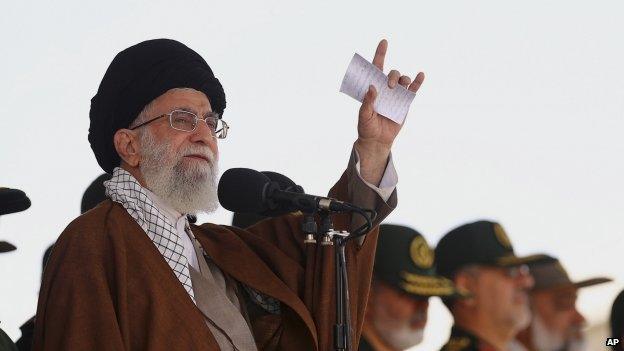
Ayatollah Ali Khamenei is the supreme ruler of Iran
Her "Collection of Happy Poems plus a few Photos" was deemed unsuitable because some of the poems had been used as lyrics by Shahin Najafi, a controversial and provocative Iranian rapper now based in Germany.
The reason the government is powerless to prevent hard-line groups disrupting events is that some key institutions answer directly to the country's Supreme Leader rather than to the president.
"There are different groups in Iran related to the Judiciary, the Revolutionary Guard Corps, and the Intelligence Services, that are not under the government's control," says Ahmad Salamatian.
"Whenever a more moderate president is elected, they become more active."

Books withdrawn from Iran's international book fair included:
Why Nations Fail - by Turkish-American economist Daron Acemoglu from the Massachusetts Institute of Technology and political scientist James A. Robinson from Harvard University
A Critical Introduction to Khomeini - by Arshin Adib-Moghaddam
Collection of Happy Poems plus a few Photos - by Fatemeh Ekhtiari

Mr Salamatian told BBC Persian the president is facing many conflicting demands on his time.
"President Rouhani can't work on everything at the same time, and right now he's focusing on the nuclear issue which he hopes will bring economic prosperity, and will strengthen his support," he says.
"But no matter what, both Rouhani and the regime know that however slowly, they will have to open the country up."
Until that happens the university professors seem unlikely to receive an answer to their letter, and the disappointed pop fans in Mahshahr might have to wait some time before they're offered an alternative date for their concert.
- Published14 October 2024
